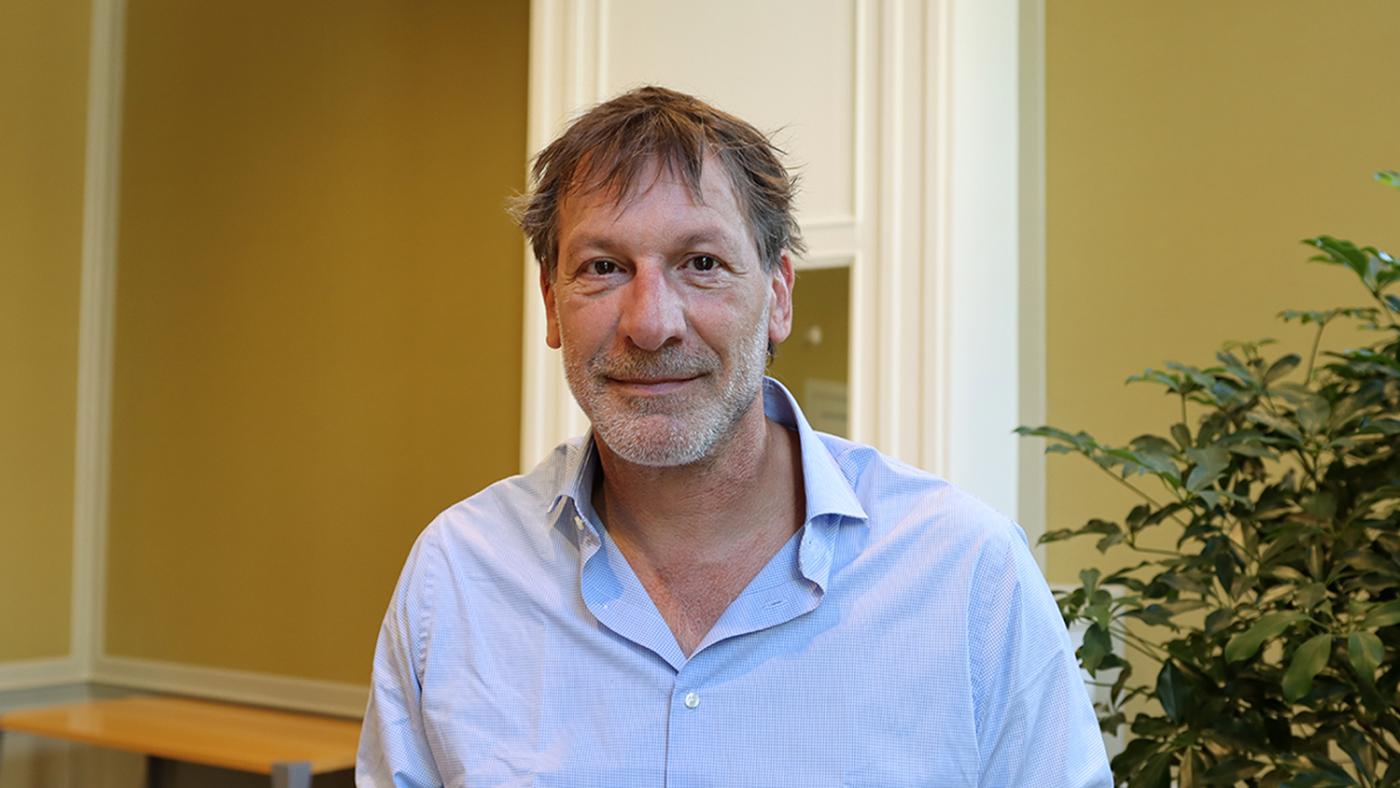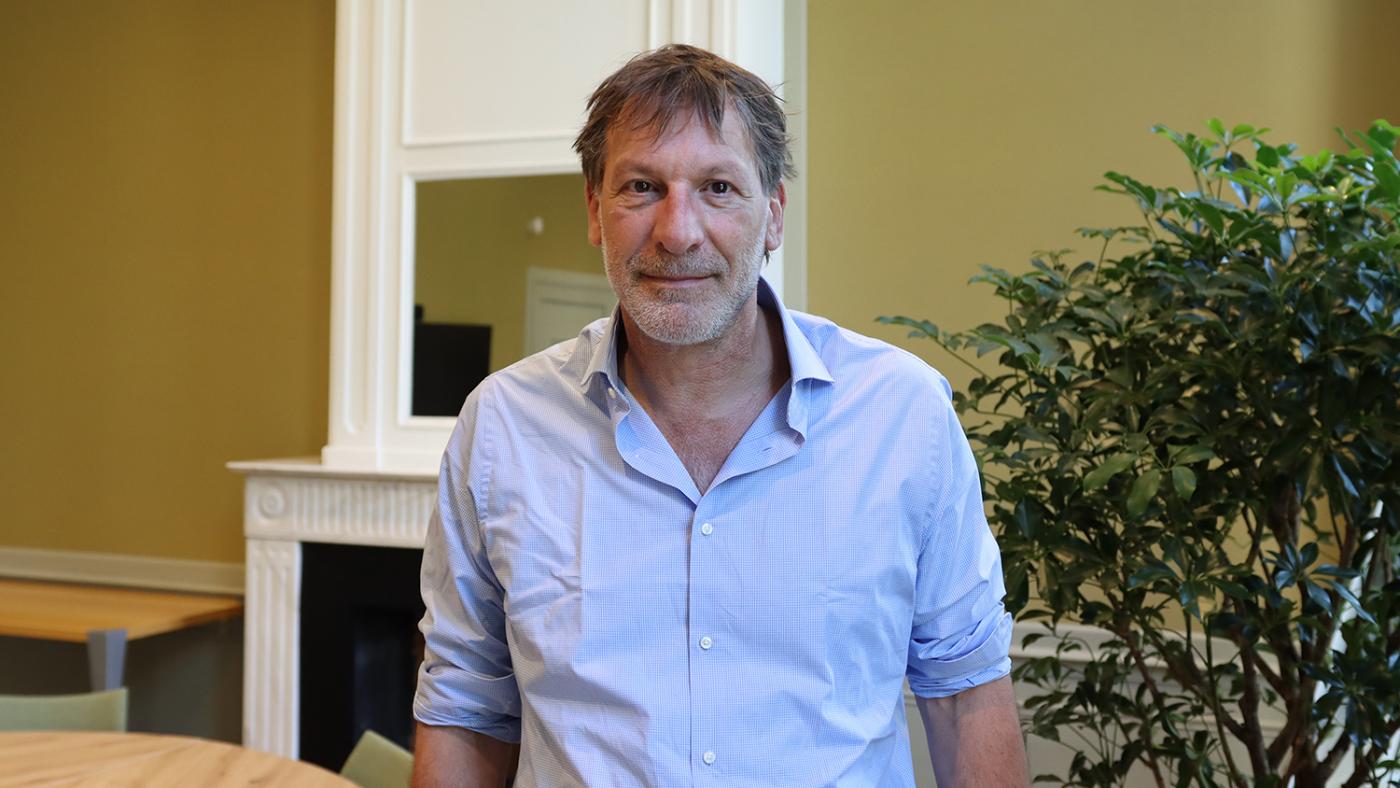Education director Bald de Vries about the unprecedented growth of the Law programme
'During some Law exams, the entire Science Park is fully booked'

When it comes to student numbers, 2020 was an astounding year for the Law programme. Instead of the usual six hundred first-year students, the programme welcomed more than one thousand. That's because the programme had relaxed its admission requirements the year before, making those with a propaedeutic degree directly admissible. The number of first-year students has remained high ever since. This academic year, 2024-2025, the programme admitted 905 freshers.
As a result, the programme needed more teachers and classrooms to maintain the quality of its education. Ensuring the programme would not become too massive and impersonal became Bald de Vries’ primary focus. He had been serving as the Education Director for the undergraduate Law programme,] including the honours programme at Utrecht Law College Utrecht (ULC), since 2019.
As an education director, Bald de Vries was responsible for providing quality education to over 3,000 Law students at the Bachelor's level. He ensured that the curriculum remained coherent, kept an eye on national developments when it came to education and liaised with other law schools in the Netherlands. De Vries was appointed Academic Director of the Centre for Academic Teaching & Learning (CAT) a few months ago. In his new role, he will focus on teacher development, educational research and educational innovation. He will also be more substantively concerned with the question: "What do we mean by 'good academic teaching' at UU?"
Workgroups
De Vries is set to strengthen the mentorship. Despite the significant student numbers, he intends to stick to working groups with a maximum of 25 students, following the Utrecht education model. According to the education director, students who actively participate in working groups feel more involved in the entire programme.
"The core of teaching takes place in the working groups. There, students discuss the material with their lecturer in many ways: by solving a case, having a discussion or - very simply - by Q&A. When students come to the working group well-prepared, one creates momentum. It also makes students feel seen and heard."
First-year students have a mentor as well as a tutor, which quickly makes them feel connected to the programme, De Vries says. "Of course, tutors change. That is typical of universities. However, most students connect with at least one tutor and notice they can build a rapport with them. I’m a tutor myself and notice that students also reach out to me. I sometimes meet a third-year student or a Master’s student. They come to spar or just say hello."
Teachers
Finding enough lecturers to do all the teaching necessary is quite a challenge. "It’s laborious to find university lecturers with a doctoral degree in areas like Private Law, Criminal Law and Administrative Law. After all, the outside world needs them too. We have to compete with the legal profession when it comes to hiring good people. As a result, we fail to find enough lecturers with a PhD degree."
Hence the use of lecturers without a PhD to fill in the gaps. These are often recent graduates who act as temporary lecturers for several years. "They are very enthusiastic, even though they are inexperienced. We provide comprehensive training to support them and guide them in leading the working groups."
According to De Vries, finding the right balance between lecturers with a PhD and without it is key. "Lecturers with a PhD know very well what is going on in their field of research. They are important for the content of our courses. At the same time, we need lecturers without a PhD degree to keep small-scale teaching alive."
The university's central policy is that only lecturers with a PhD can get a permanent contract, whereas temporary lecturers can only be hired for four years. De Vries would like temporary teachers without PhD degrees to get permanent contracts too as this would enable them to develop their teaching skills further: they wouldn't just teach work groups, they would coordinate courses as well. De Vries is convinced that it would be valuable for the programme to have a mix of lecturers with and without PhDs, some hired temporarily, others permanently.

Shortage of lecture halls
Law students also need a place to have their lectures and, with such a large group, that becomes a challenge too. The Faculty of Law is currently dealing with a shortage of large lecture halls. They must compete with other programmes whose student numbers have also grown in recent years.
UU's largest auditorium, Theatron, has room for five hundred people, which is too small to fit all Law freshers. Consequently, some students can attend the lecture in person, while the rest must follow the live stream from home or watch a recording afterwards. "Most of the time, lecturers allow students to sign up for a lecture in advance, so they don't come to the lecture hall only to find no seats available."
There are no rooms large enough for the exams of the major courses, either. "When the largest course holds its final exam, every room at Utrecht Science Park is fully booked, including Olympos and the exam rooms at Educatorium. It is quite a logistical operation to have so many students take exams simultaneously, then check those exams, and register the grades in a relatively short time."
Big lectures
De Vries is not in favour of big lectures and believes the university should revise its policy on the matter. "Educational research shows that the learning effect is minimal. It’s impossible to engage five hundred students in a lecture. The first row might still ask a question occasionally, but that interaction decreases per row. Besides, most students' attention span doesn't last ninety minutes."
"We can devise all kinds of alternatives that would be more interactive, interesting, and effective in making students think. For example, the lecturer could interview a specialist, create a podcast, or organise a class with a group of, say, 50 students, in which they would do nothing but ask questions. The rest of the students could follow the meeting online. A bit like going to the theatre or watching 60 Minutes on TV."
Neurodivergence
The education director notes that it is becoming increasingly difficult to provide customised services to all students. He argues that, since the Covid-19 pandemic, students have become more demanding and thus more likely to expect the university to cater to their personal needs. "The university needs to take neurodivergent students into account, but we also need to find the right balance in this regard. As a community, we do things together, meaning individual interests are sometimes secondary to the collective interest. Where can we find common ground?"
He continues: "We can provide small-scale teaching and students can go to student advisers for a modified timetable or to prevent themselves from failing to obtain enough credits to be allowed to proceed to the second year, but there will always be exceptional cases."
"Some students need adjustments ranging from an adapted table or chair because of back problems, or a quiet room because of massive overstimulation. But what does ‘quiet’ mean: complete solitude or a small room with 10 or 20 students? We have exams with a thousand students at the same time. We cannot have several students take a test by themselves, we simply don't have the facilities for that. We’ve reached the end of our capacity."
Teaching quality
De Vries acknowledges that the current scale of the programme poses a risk to teaching quality and that the scarcity of lecture halls affects teaching. As far as he is concerned, educational innovations could provide a solution, with the programme focusing more on blended education. He believes that the Law undergraduate programme can still provide high-quality education through digital forms of learning and a strong focus on working groups on campus.
However, the education director fears the government's decision to cut almost a billion euros from the higher education and research budget. In his view, cutbacks to education should be done with care. "High-quality education pays for itself as it ensures that students are well-prepared to pass their courses. If budget cuts are made in the wrong areas, it becomes increasingly difficult for students to pass, resulting in them having to redo a course. That costs a lot of money. It’s important not to neglect our teaching just because we want fewer contact hours, for example. We are shooting ourselves in the foot. Good education is an investment which pays for itself."
Despite the challenges, De Vries is not in favour of enrolment caps, at the national level or otherwise. "I like the accessibility and freedom of choice of our education. I understand that things are different for other programmes such as Medicine, which is expensive. But, in Law, I don’t see the need for it, as long as we can ensure that students can study well."
Resits
At the Faculty of Law, a debate about resit rules has been raging for over a decade. When a student retakes an exam and passes it, they get 6 as a grade. If they don't, the original failing grade remains. Law differs here from other programmes at UU, where students can get a grade higher than a 6 when retaking exams, which is why Law students would like their resit rules to change.
De Vries gets visibly frustrated when this subject comes up during the interview. He says this discussion is annoying him more and more because the issue "is revisited constantly, while we are one of the best studies in the Netherlands in terms of number of students who graduate."
"The whole idea of a university degree is to have learning objectives and address them through study and teaching activities. We have different forms of tests to check whether students meet the goals we set. Students are supposed to do that during the course and not six months later, by taking a test in the summer. That’s nonsense."
Educational goals
The education director fears that abandoning the 'pass' or 'fail' option will make studies too non-committal. "If we do that, the student will be able to decide when and which test to take, and the last highest grade will count, no matter how many times they took the exam. What do you think will happen? Everyone will go for a resit until they get an 8."
"I think we'd take the sting out of it if we switched to alternative forms of testing that would remove the focus from exams. In some elective courses I teach, for example, there are no exams. Students complete multiple assignments throughout the course, such as writing essays or op-eds on legal questions or social problems. They also present their work to each other. The best thing would be if we stopped grading them and only awarded pass or fail. That would significantly reduce performance pressure. Together with lecturers and students, we should look for alternative exam formats that suit the Law programme."